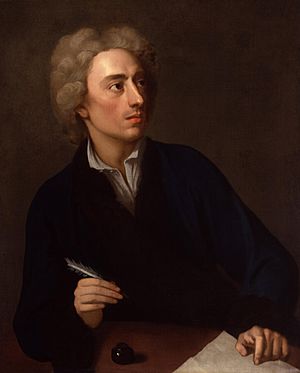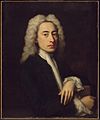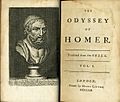Alexander Pope facts for kids
Quick facts for kids
Alexander Pope
|
|
|---|---|

Portrait by Michael Dahl, c. 1727
|
|
| Born | 21 May 1688 O.S. London, England |
| Died | 30 May 1744 (aged 56) Twickenham, Middlesex, England |
| Resting place | St Mary's Church, Twickenham, Middlesex, England |
| Occupation | Poet, writer, translator |
| Notable works | The Dunciad, An Essay on Criticism, His translation of Homer |
| Signature | |
 |
|
Alexander Pope (born May 21, 1688 – died May 30, 1744) was a famous English poet, translator, and satirist. He lived during the Age of Enlightenment, a time when new ideas about reason and science were popular. Many people consider him one of the most important English poets of the early 1700s.
Pope is especially known for his funny and thoughtful poems. These include The Dunciad and An Essay on Criticism. He also translated the ancient Greek poems of Homer into English. After William Shakespeare, Alexander Pope is the second most quoted writer in The Oxford Dictionary of Quotations. Some of his famous lines are still used today, like "damning with faint praise" and "to err is human; to forgive, divine".
Contents
Life of Alexander Pope
Alexander Pope was born in London on May 21, 1688. This was the year of the Glorious Revolution, a big change in English government. His father, also named Alexander Pope, was a successful merchant. His mother, Edith, came from York. Both of his parents were Catholics.
Early Education and Challenges
Pope's education was affected by laws called the Test Acts. These laws supported the Church of England. They stopped Catholics from teaching, going to university, voting, or holding public jobs. Because of these laws, Pope was taught to read by his aunt. He also went to two Catholic schools in London, which were technically illegal but sometimes allowed.
In 1700, Pope's family moved to a small home in Binfield, Berkshire. This move was partly because of strong feelings against Catholics. A law prevented Catholics from living within 10 miles (16 km) of London. Pope later wrote about the countryside around his new home in his poem Windsor Forest.
Pope's formal schooling ended around this time. He mostly taught himself by reading. He studied famous writers from ancient times like Horace and Juvenal, who wrote satires (funny criticisms). He also read epic poets like Homer and Virgil. English writers like Geoffrey Chaucer, William Shakespeare, and John Dryden were also important to him. He learned many languages and read poems from France, Italy, Latin, and Greek.
Health and Friendships
From the age of 12, Pope had many health problems. He suffered from Pott disease, a type of tuberculosis that affected his spine. This made his body deformed and stopped his growth. He grew to be only 4 feet 6 inches (137 cm) tall and had a severe hunchback. His illness also caused breathing problems, fevers, eye pain, and stomach aches.
Being Catholic already set him apart from society. His poor health made him feel even more isolated. Even though he never married, he had many female friends. He wrote clever letters to them, including Lady Mary Wortley Montagu.
Around 1711, Pope became friends with Tory writers like Jonathan Swift and John Arbuthnot. They formed a group called the Scriblerus Club. Their goal was to make fun of ignorance and overly serious scholars. He also became friends with Whig writers Joseph Addison and Richard Steele.
Moving to Twickenham
In 1719, Pope used the money he earned from translating Homer to buy a villa in Twickenham. There, he created his famous grotto and gardens. A grotto is a small cave or cave-like structure. He found a spring while digging, which filled his grotto with the peaceful sound of water. He once said, "Were it to have nymphs as well – it would be complete in everything."
The house and gardens are gone now, but much of the grotto still exists. It is under Radnor House Independent Co-educational School. The grotto has been fixed up and will be open to the public some weekends starting in 2023.
Pope's Famous Poetry
Alexander Pope wrote many important poems. He used a style called "heroic couplets," which means two rhyming lines of poetry.
An Essay on Criticism
An Essay on Criticism was first published in 1711. Pope started writing it early in his career and it took him about three years to finish. This poem was an important way for Pope to share his ideas about what makes good poetry and good criticism.
The poem talks about the rules for writing poetry and how critics should judge it. Pope discussed classical writers who set these standards. He also explained how critics should help poets improve their work, instead of just attacking them. The poem ends by describing the good qualities of an ideal critic, who Pope believed was also an ideal person.
The Dunciad and Moral Essays
The Dunciad was a satirical poem that made fun of many writers and scholars Pope thought were foolish. It was first published without his name on it, but everyone knew he wrote it. One expert, Maynard Mack, called its publication "in many ways the greatest act of folly in Pope's life." This is because it made many enemies for Pope.
Some people Pope made fun of in The Dunciad were so angry they threatened him. Pope's half-sister said he wasn't afraid. She explained that he liked to walk alone, so he went with his large dog, Bounce. For a while, he even carried pistols in his pocket.
In 1731, Pope published "Epistle to Burlington." This poem was about architecture and was the first of four poems later called the Moral Essays. These essays made fun of bad taste, especially among rich people.
An Essay on Man
An Essay on Man is a philosophical poem published between 1732 and 1734. Pope wanted it to be the main part of a larger series of poems about ethics, or how people should live. He did not live long enough to finish the whole project.
The poem tries to "explain God's ways to Man." It suggests that the universe, even if it seems imperfect or confusing, works in a logical way. Pope believed the universe is a perfect creation of God. He thought that humans see it as imperfect because our minds are limited. He argued that people should accept their place in the "Great Chain of Being." This idea suggests that all living things are connected in a hierarchy, from God down to the smallest creatures. If humans accept their place, they can live happy and good lives.
The poem is a statement of faith. It says that life might seem messy to humans, but it is actually ordered by God. Pope believed that God exists and is the center of the universe. Since human intelligence is limited, we can only see small parts of this order. Because of this, humans must rely on hope, which leads to faith. Pope said that a person's duty is to try to be good, no matter what else is happening.
Later Works and Death
After 1738, Pope wrote less new material. He thought about writing a long poem about a patriotic hero called Brutus, but only the first lines exist. His main work in these later years was to update and expand his masterpiece, The Dunciad. The final version came out in 1743. In this version, he replaced the original "hero" with Colley Cibber, who was the official Poet Laureate of the United Kingdom. However, the real target of the poem was the politician Robert Walpole.
Pope's health, which was never good, got worse. On the morning he died, his doctor told him he was better. Pope replied, "Here am I, dying of a hundred good symptoms." He died at his villa in Twickenham on May 30, 1744. The day before, he had received the Last Rites of the Catholic Church. He was buried in St Mary's Church, Twickenham.
Translations and Editions
Translating Homer
Pope loved the ancient Greek poet Homer since he was a child. In 1713, he announced he would translate Homer's Iliad. He sold the translation by subscription, meaning people paid in advance. One volume would come out each year for six years. Pope made a very good deal with his publisher, Bernard Lintot. He earned 200 guineas (£210) per volume, which was a huge amount of money at the time.
His translation of the Iliad was published between 1715 and 1720. It was praised by many, including Samuel Johnson, who called it "a performance which no age or nation could hope to equal."
After the success of the Iliad, Pope also translated Homer's Odyssey. This five-volume translation came out between 1725 and 1726. For this project, Pope worked with two other writers, William Broome and Elijah Fenton. Pope translated 12 of the 24 books himself.
Editing Shakespeare's Works
Pope was also hired by a publisher to create a new edition of William Shakespeare's plays. When it was published in 1725, Pope changed Shakespeare's rhythm and rewrote some parts of the verses. He also removed about 1,560 lines of Shakespeare's original writing.
In 1726, a lawyer and poet named Lewis Theobald published a strong criticism of Pope's Shakespeare edition. Theobald pointed out many errors in Pope's work. This made Pope very angry, and Theobald became the main target of Pope's satirical poem, The Dunciad.
Works by Alexander Pope
Major Works
- 1709: Pastorals
- 1711: An Essay on Criticism
- 1712: Messiah
- 1713: Windsor Forest
- 1715: The Temple of Fame: A Vision
- 1717: Eloisa to Abelard
- 1717: Elegy to the Memory of an Unfortunate Lady
- 1727: Peri Bathous, Or the Art of Sinking in Poetry
- 1728: The Dunciad
- 1731–1735: Moral Essays
- 1733–1734: Essay on Man
- 1735: Epistle to Dr Arbuthnot
Translations and Editions
- 1715–1720: Translation of the Iliad
- 1723–1725: The Works of Shakespear, in Six Volumes
- 1725–1726: Translation of the Odyssey
Other Works
- 1700: Ode on Solitude
- 1713: Ode for Musick
- 1715: A Key to the Lock
- 1717: The Court Ballad
- 1717: Ode for Music on St. Cecilia's Day
- 1728: Peri Bathous, Or the Art of Sinking in Poetry
- 1731: An Epistle to the Right Honourable Richard Earl of Burlington
- 1733: The Impertinent, or A Visit to the Court
- 1736: Bounce to Fop
- 1737: The First Ode of the Fourth Book of Horace
- 1738: The First Epistle of the First Book of Horace
Images for kids
See also
 In Spanish: Alexander Pope para niños
In Spanish: Alexander Pope para niños
- Alexander Pope - Wikiquote
- Characters and Observations
- List of abolitionist forerunners
- Pope's Urn






